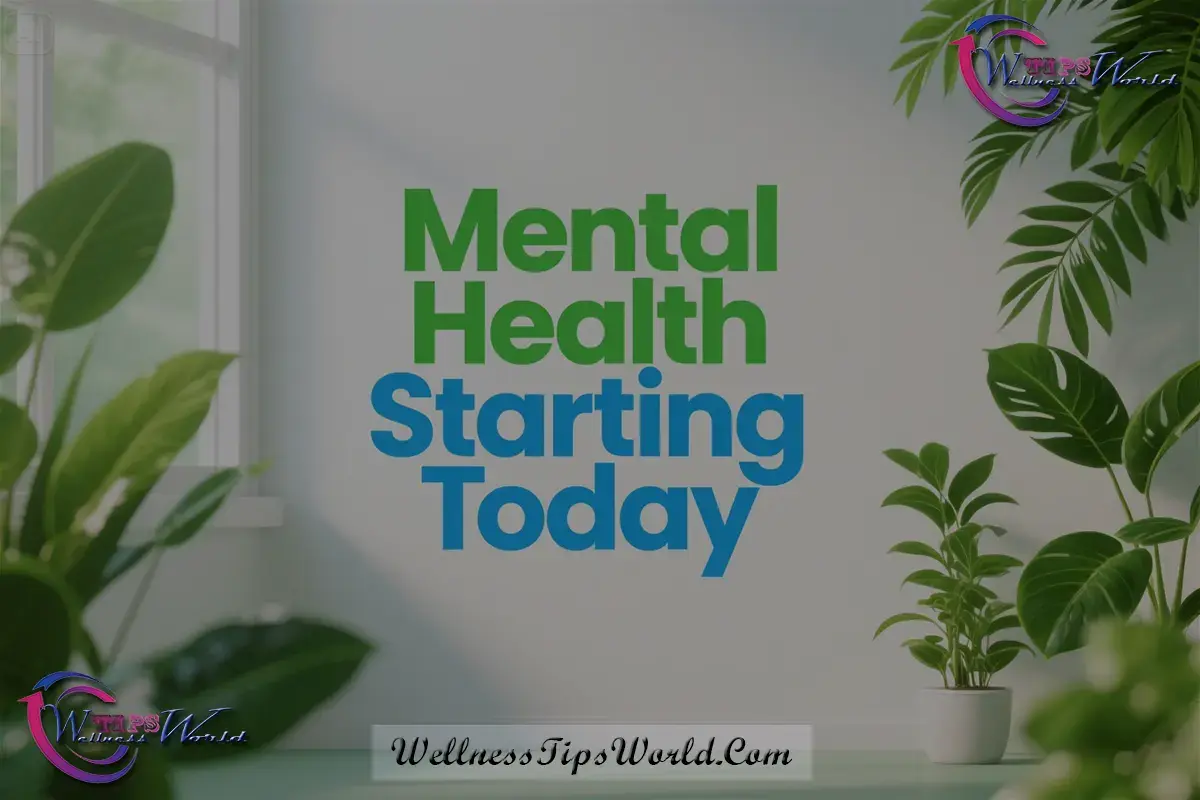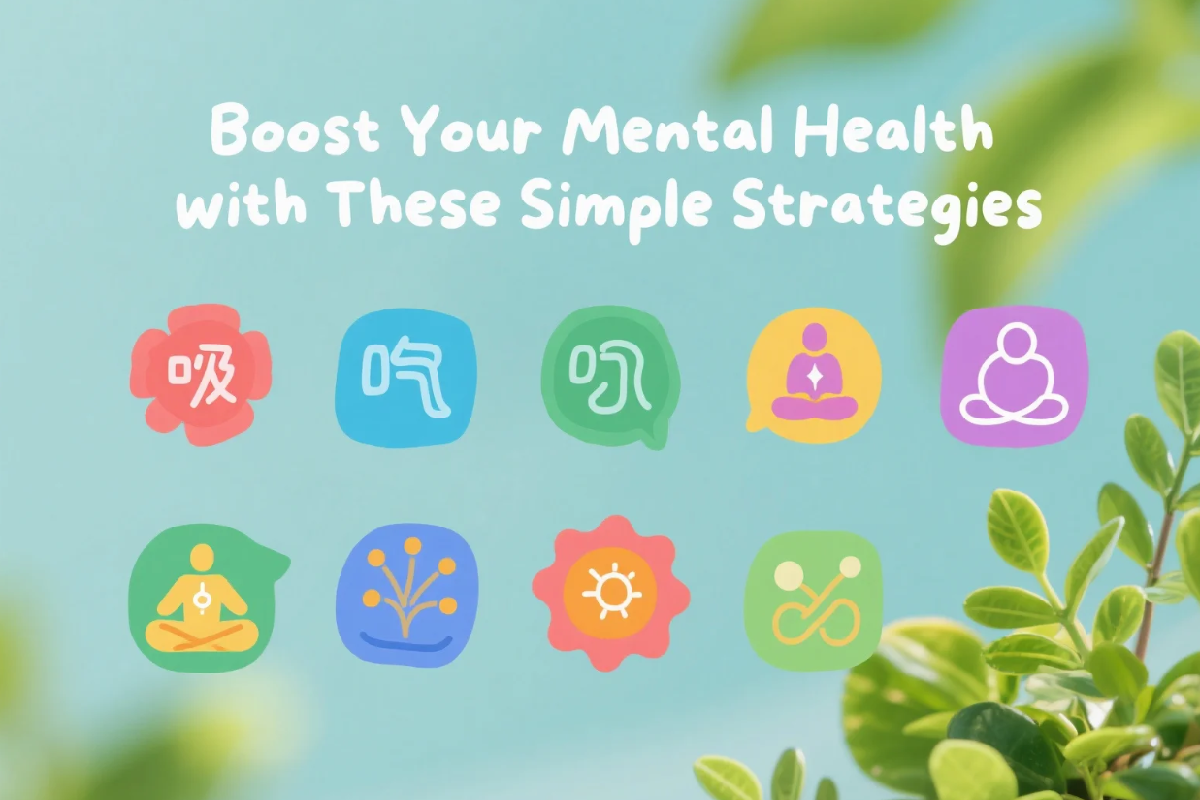How to Improve Your Mental Health Starting Today
-
82
- 22 May, 2025

In today's rapidly moving world, mental health tends to be neglected, even though it plays a crucial role in our overall well-being. With the increasing pressures of work, relationships, and personal challenges, it’s easy to feel overwhelmed. However, the good news is that mental health improvement is within your control, and it can start today.
In this article, we will explore actionable steps that can improve your mental health, provide insights into effective strategies, and offer resources that empower you to take charge of your well-being. Whether you’re looking for quick fixes or long-term solutions, you’ll find valuable advice here.
The Importance of Mental Health
Mental health is just as crucial as physical health, yet it's often the one we ignore. Good mental health allows you to cope with the stresses of life, build strong relationships, and enjoy a fulfilling life. Unfortunately, when mental health deteriorates, it can lead to serious conditions such as anxiety, depression, and stress.
Understanding that mental health is something that needs to be nurtured is the first step toward improvement. You don’t need to wait for a crisis to make changes—taking proactive steps today can help you lead a more balanced life tomorrow.
1. Practice Mindfulness and Meditation: Cultivating Awareness
Practicing mindfulness is among the most powerful ways to enhance mental well-being. This involves being present in the moment without judgment. Mindfulness and meditation are scientifically proven to reduce stress, anxiety, and negative thinking.
How to Start Mindfulness:
- Breathing exercises: Begin by focusing on your breath for a few minutes each day. Deep breathing helps reduce mental clutter and promotes calmness.
- Guided meditation apps: Use free apps like Headspace or Calm to get started with guided sessions that range from a few minutes to longer periods.
Benefits:
- Reduces stress and anxiety.
- Promotes a more positive outlook on life.
- Helps you stay present and focused.
2. Exercise Regularly: Boosting Your Mood
Physical activity is not only good for your body, but it also has powerful benefits for your mental health. Exercise triggers the production of endorphins, which act as natural mood lifters. Consistent physical activity helps alleviate symptoms of depression and anxiety, improves sleep quality, and promotes a healthier, more positive mindset.
Tips for Getting Started:
- Aim for at least 30 minutes of exercise, three times a week.
- Start with something simple: walking, cycling, or yoga.
- Discover an exercise you love, so it becomes a consistent part of your routine.
Benefits:
- Reduces symptoms of depression and anxiety.
- Improves energy levels and mental clarity.
- Enhances your sleep quality.
3. Nurture Your Relationships: Social Support
Human connections are crucial for mental health. Building and maintaining healthy relationships can provide a strong support system during challenging times. Studies show that having a good social network can improve your overall well-being and lower your risk of mental health disorders.
How to Strengthen Your Relationships:
- Communicate openly with family and friends.
- Join support groups or engage in local community activities.
- If necessary, don't hesitate to seek professional help, like couples therapy or counseling.
Benefits:
- Provides emotional support.
- Encourages healthy coping mechanisms.
- Reduces feelings of loneliness and isolation.
4. Prioritize Sleep: Restoring Your Energy
Sleep plays a vital role in maintaining mental health. Poor sleep can lead to irritability, mood swings, and increased stress. On the other hand, good sleep can enhance cognitive function, improve your emotional well-being, and help your body repair itself.
Tips for Better Sleep:
- Stick to a consistent sleep schedule.
- Refrain from using screens for at least an hour before bedtime.
- Create a calm, relaxing bedtime routine to signal to your body it’s time to wind down.
Benefits:
- Enhances memory and cognitive function.
- Improves mood and emotional regulation.
- Increases energy and focus.
5. Seek Professional Help When Needed: Therapy and Counseling
There’s no shame in seeking professional help for mental health challenges. Whether you're coping with ongoing challenges like depression or temporary stress, therapy can equip you with the tools to manage your thoughts and emotions more effectively.
Types of Therapy:
- Cognitive Behavioral Therapy (CBT): Concentrates on altering harmful thought patterns.
- Talk therapy: A general approach that involves discussing emotions and problems with a counselor or psychologist.
- Online therapy: A convenient and accessible option for people who prefer remote consultations.
Benefits:
- Helps you gain insights into your thoughts and behaviors.
- Offers techniques for managing challenging emotions.
- Creates a safe space to explore deeper issues.
6. Maintain a Healthy Diet: Nourishing Your Mind
What you eat directly impacts your mental health. A well-rounded, nutritious diet can boost both mood and energy levels. On the other hand, poor eating habits can exacerbate feelings of anxiety and depression.
Foods That Boost Mental Health:
- Omega-3 fatty acids, abundant in fish like salmon, and antioxidant-rich foods such as berries, nuts, and leafy greens, play a key role in supporting brain health.
- Whole grains, which help regulate blood sugar and support mental clarity.
Tips for a Healthy Diet:
- Aim for a well-rounded diet with plenty of fruits, vegetables, and lean proteins.
- Reduce your consumption of processed foods and sugary treats.
- Stay hydrated throughout the day.
Benefits:
- Enhances cognitive function and concentration.
- Balances mood and reduces irritability.
- Strengthens your immune system.
7. Limit Screen Time: Disconnect to Reconnect
In the age of technology, it’s easy to spend hours scrolling through social media or watching television. However, excessive screen time can negatively impact your mental health, increasing stress, anxiety, and loneliness.
How to Limit Screen Time:
- Set specific times for checking social media or emails.
- Utilize apps that monitor your screen time to help you stay accountable.
- Take regular breaks from screens to reconnect with the real world.
Benefits:
- Reduces stress and digital overload.
- Increases productivity and focus.
- Enhances face-to-face connections.
8. Practice Gratitude: Shifting Your Focus
Gratitude is a powerful tool that can help improve your mental health by changing your mindset. Regularly reflecting on the positive aspects of your life can boost happiness and reduce feelings of negativity.
How to Practice Gratitude:
- Begin a gratitude journal and note three things you're grateful for every day.
- Share your appreciation with others, whether it’s a compliment or a thank-you note.
Benefits:
- Enhances positive thinking and emotional well-being.
- Improves relationships by fostering kindness.
- Reduces stress and promotes a peaceful mindset.
9. Develop a Hobby: Engage in Activities You Enjoy
Having a hobby not only provides a healthy escape from everyday pressures, but it also fosters creativity, boosts self-esteem, and offers a sense of purpose.
How to Get Started:
- Pick an activity that excites you—painting, writing, gardening, cooking, or playing an instrument.
- Dedicate time to your hobby regularly.
- Think about becoming a member of a club or group that aligns with your interests.
Benefits:
- Provides an outlet for stress.
- Enhances self-esteem and personal satisfaction.
- Helps you feel more fulfilled.
10. Practice Self-Compassion: Be Kind to Yourself
It's natural to be tough on yourself when things don't go according to plan. However, practicing self-compassion can help you manage difficult emotions and cultivate a healthier relationship with yourself.
How to Practice Self-Compassion:
- Show yourself the same kindness and compassion you would offer to a friend.
- Steer clear of negative self-talk and substitute it with positive affirmations.
- Acknowledge your feelings without judgment.
Benefits:
- Reduces feelings of guilt and shame.
- Promotes mental well-being and resilience.
- Encourages a more positive self-image.
Take Action for Your Mental Health
Improving your mental health doesn’t have to be overwhelming. By starting with small, manageable steps such as practicing mindfulness, prioritizing sleep, and engaging in physical activity, you can begin to feel better today. Remember, the journey toward better mental health is a gradual process, and consistency is key.
By focusing on these strategies, you can enhance your mood, build resilience, and ultimately lead a more fulfilling life. It’s never too late to start—take action today and invest in your mental well-being.










